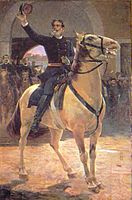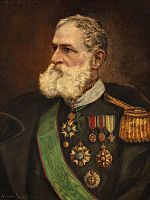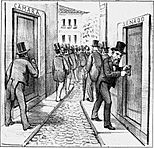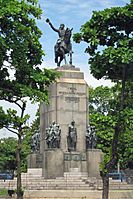Deodoro da Fonseca facts for kids
Quick facts for kids
His Excellency Generalissimo
Deodoro da Fonseca
|
|
|---|---|
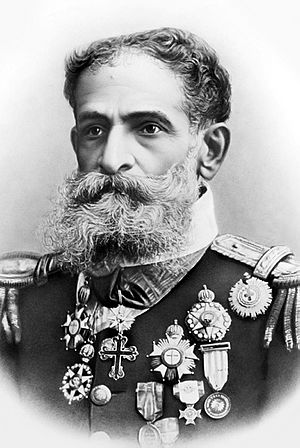
Marshal Fonseca in 1889
|
|
| President of Brazil | |
| In office 15 November 1889 – 23 November 1891 |
|
| Vice President | None (1889–1891) Floriano Peixoto (Feb–Nov 1891) |
| Preceded by | Office established |
| Succeeded by | Floriano Peixoto |
| President of the Rio Grande do Sul Province | |
| In office 8 May 1886 – 9 November 1886 |
|
| Preceded by | Baron of Lucena |
| Succeeded by | Miguel Calmon du Pin |
| Personal details | |
| Born | 5 August 1827 Alagoas da Lagoa do Sul, Alagoas, Empire of Brazil |
| Died | 23 August 1892 (aged 65) Rio de Janeiro, Federal District, Brazil |
| Political party | Independent |
| Spouse |
Mariana Cecília de Sousa Meireles
(m. 1860) |
| Relations | Hermes da Fonseca (nephew) |
| Parents | Manuel Mendes da Fonseca Galvão (father) Rosa Maria Paulina de Barros Cavalcanti (mother) |
| Alma mater | Praia Vermelha Military School |
| Signature | |
| Military service | |
| Allegiance | |
| Branch/service | |
| Years of service | 1843–1892 |
| Rank | Generalíssimo (Army) Almirantíssimo (Navy) |
| Commands |
|
| Battles/wars | Great Siege of Montevideo Praieira Revolt
|
| Awards | Order of the Southern Cross |
Manuel Deodoro da Fonseca (born August 5, 1827 – died August 23, 1892) was a Brazilian military officer and politician. He became the very first president of Brazil. Fonseca took office as a temporary president after leading a military takeover. This event removed Emperor Pedro II from power and created the First Brazilian Republic in 1889. He was elected president in 1891 but resigned later that year due to strong political pressure. He passed away less than a year later.
Contents
Early Life and Military Career
Fonseca was born on August 5, 1827, in a town called Alagoas da Lagoa do Sul. This town is now named Marechal Deodoro, Alagoas in his honor. He came from a large family with many members in the military. His father was Manuel Mendes da Fonseca Galvão, and his mother was Rosa Maria Paulina de Barros Cavalcanti.
Fonseca chose a military career, just like his family. He helped stop the Praieira revolt in Pernambuco in 1848. This was Brazil's response to the revolutions happening in Europe at that time. He also fought in the Paraguayan War (1864–1870), where he became a captain. By 1884, he was promoted to field marshal, and later to full marshal. People admired him for his bravery and military skills. He became a well-known figure across Brazil.
Path to Presidency
Fonseca served as the Governor of Rio Grande do Sul. During this time, he met important thinkers who supported a republic, like Benjamin Constant. In 1886, Fonseca learned that the government planned to arrest leading republicans. He then went to Rio de Janeiro and took charge of the army group that wanted to end slavery in Brazil.
Emperor Pedro II had wanted to end slavery for many years. He freed his own enslaved people in 1840. However, he believed slavery should end slowly to avoid harming Brazil's economy. In 1888, his daughter, Isabel, Princess Imperial of Brazil, who was ruling while her father was away, completely abolished slavery. This decision made some powerful landowners very angry.
Fonseca's high standing led him to lead the military takeover that removed the emperor on November 15, 1889. He briefly headed a temporary government. This government then called a meeting to write a new constitution for a republic. Soon, Fonseca began to disagree with the civilian leaders who also supported the republic. He was elected president on February 25, 1891, by a small number of votes. The military's support helped him win this election.
Presidency and Resignation
Fonseca's time as president was difficult. He and his Vice President, Floriano Peixoto, did not get along. The Brazilian Congress strongly opposed Fonseca's actions. At first, he let his ministers control their departments almost completely. However, he started making decisions on his own. For example, he gave a private company control of the port of Torres, Rio Grande do Sul. He also issued a decree that allowed more immigration to Brazil, but not from Africa.
His economic policies were also not successful. There was an economic bubble called the Encilhamento, which caused problems. These issues made Congress resist him more and made the public unhappy. Even republicans in the South stopped supporting him. The situation became very serious when Fonseca closed the National Congress on November 3, 1891. He also declared a "state of emergency."
A group of lawmakers disagreed with his decision. They found support among high-ranking Navy officers, including Admiral Custódio José de Melo. Fonseca realized he was close to a civil war. On November 23, 1891, he signed a resignation letter and gave the presidency to Peixoto.
Death
Deodoro da Fonseca passed away in Rio de Janeiro on August 23, 1892. He suffered from severe breathing problems. He was first buried in a family grave at the Caju Cemetery. However, in 1937, his remains were moved to a special monument in Praça Paris, Rio de Janeiro.
Gallery
- Deodoro da Fonseca in art
See also
 In Spanish: Deodoro da Fonseca para niños
In Spanish: Deodoro da Fonseca para niños
- List of presidents of Brazil
 | DeHart Hubbard |
 | Wilma Rudolph |
 | Jesse Owens |
 | Jackie Joyner-Kersee |
 | Major Taylor |


